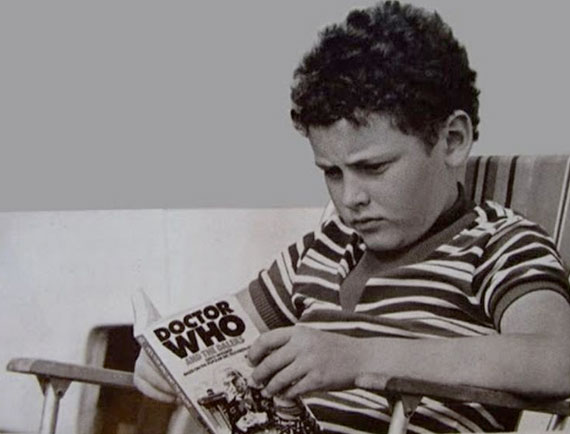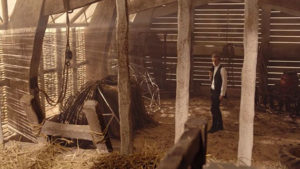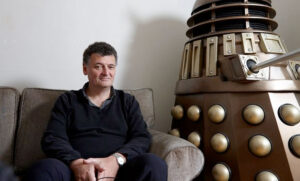How I Finally Realised I Was Wrong About Moffat
Guest contributor Paul J Eric on lore, the fan and the showrunner

Hands up everyone reading who has, at some point in the past year, deliberately exposed themselves to Doctor Who fan fiction. That is to say a piece of writing produced by a fan of the show, that builds upon the established lore and incorporates elements of the producers personal ‘head canon’, trying to tie it into the existing mythos. Every single one of you should have your hands up.
Doctor Who is in a very strange position for a TV show, in that its current showrunners were also raised watching the show. Now I am not saying that this is a particularly bad thing, a number of other franchises are indeed in similar positions, it means we as the audience get a sense of continuity between episodes that deal with the lore surrounding the show, and we can be quite safe in the knowledge that the show is not going to be completely run into the ground by a producer that does not know how to handle it properly.
 That being said, how many of us can honestly say we don’t have our own imaginative lore? How many of us can say we haven’t come up with our own dream Doctor Who episodes? Do you really think that those dream episodes will ever appear on our televisions, short of you yourself becoming a writer for the show? Imagine that you one day became a writer. Who wouldn’t immediately indulge in their childhood fantasies? I for one would jump at the opportunity to have my fan fiction broadcast to the world, abandoning all logical thought in favour of a horror episode set on the ruined remains of Mondas as it orbits Earth and UNIT soldiers are picked off by Tenth Planet style Cybermen. Except, of course, not once do we see parts of the destroyed Mondas still orbiting Earth, and many would argue that not a single atom of the planet remained after it was destroyed. This is the problem with head canon, it conflicts not only with established lore but also with everyone else’s head canon. And when the writers are fans bringing in their own head canon they alter the lore of the show.
That being said, how many of us can honestly say we don’t have our own imaginative lore? How many of us can say we haven’t come up with our own dream Doctor Who episodes? Do you really think that those dream episodes will ever appear on our televisions, short of you yourself becoming a writer for the show? Imagine that you one day became a writer. Who wouldn’t immediately indulge in their childhood fantasies? I for one would jump at the opportunity to have my fan fiction broadcast to the world, abandoning all logical thought in favour of a horror episode set on the ruined remains of Mondas as it orbits Earth and UNIT soldiers are picked off by Tenth Planet style Cybermen. Except, of course, not once do we see parts of the destroyed Mondas still orbiting Earth, and many would argue that not a single atom of the planet remained after it was destroyed. This is the problem with head canon, it conflicts not only with established lore but also with everyone else’s head canon. And when the writers are fans bringing in their own head canon they alter the lore of the show.
Let’s deal with the positives first. Sticking strictly to science-fiction, there are innumerable examples of outstanding official works produced for franchises such as Star Trek and Star Wars by people who were raised by the shows and films, and, of course, they have both had new instalments produced recently by the same director. JJ Abrams has gone on record and said that he is a fan of Wars, but never really got into Trek, so we can hold these new instalments up as examples of what may happen to Doctor Who with either a fan or a non-fan as showrunner. Both franchises, like Doctor Who has been recently, are geared mainly towards introducing them to a new audience, the so called ‘casual viewer’, but they still retain features that will be appealing to fans as well, and yet fan reactions differ wildly between the two. Abrams’ Trek films received heavy criticism from diehard fans whereas his Wars film has been praised. This makes it very clear that having someone who truly cares for what they are producing in charge is a massive benefit for us as fans of the show.
 Continuity-wise the Wars film follows on from the old films and, although its existence has resulted in the removal of all Expanded Universe canon, it still incorporates elements from the EU and keeps itself mostly rooted in the established lore, a lot like fan fiction does. The Trek films deliberately change the continuity, yes, but even before the alternate universe is supposed to have been created there are discrepancies that clearly arise from a non-fan misunderstanding the property. This is like if I watched the second episode of a Game of Thrones series, something I know nothing about, and was then told to write a plot summary for the first episode of the series. So that’s another point in favour of Doctor Who being run by a fan.
Continuity-wise the Wars film follows on from the old films and, although its existence has resulted in the removal of all Expanded Universe canon, it still incorporates elements from the EU and keeps itself mostly rooted in the established lore, a lot like fan fiction does. The Trek films deliberately change the continuity, yes, but even before the alternate universe is supposed to have been created there are discrepancies that clearly arise from a non-fan misunderstanding the property. This is like if I watched the second episode of a Game of Thrones series, something I know nothing about, and was then told to write a plot summary for the first episode of the series. So that’s another point in favour of Doctor Who being run by a fan.
Now I’m afraid it’s time for the negatives. As I pointed out earlier the individual head canons of fans rarely sync up with those of other fans, we all have our own lore we would like to include, we all have our own dream episodes we’d like to see broadcast. We also have characters that we like and dislike, and Mr. Moffat has gone on record and said that he is not a fan of the Rani, a factor which I suspect led to him giving us a female Master, but would a non-fan have done that? Would someone who has no links to the show look at a character from the classic series and dismiss them simply because they don’t like them? I think a non-fan would have a much more balanced approach, seeing if the character would fit within a story before outright dismissing them for personal reasons.
 Lore-heavy episodes such as The Name of the Doctor, Day of the Doctor, and Hell Bent give us an insight into Mr. Moffat’s head canon, and I have to wonder how long some of those plot elements have been in his mind. How long had he imagined the barn the Doctor grew up in? Since Lungbarrow? Or longer? How long had he thought about a guardian angel existing within the Doctor’s time stream, saving him from peril? Had he always imagined this mystery person, or was it made up on the fly? I recall a small amount of complaint surrounding the blue sky seen on Gallifrey in Day of the Doctor and again in Hell Bent, but wasn’t the red sky introduced under Mr. Davies anyway? Did we not see a blue sky in episodes such as The Five Doctors? This is what I mean about head canon being contradictory. We have the Gallifrey and the Time Lords of the classic series, and then Mr. Davies attempts to overwrite it with slight variations, and then Mr. Moffat brings it back into closer alignment with the classic series, while still being different. Surely a non-fan writer would have kept it in line with the classic series and only made pragmatic changes, instead of re writing elements of the lore? And this is replicated across so many other aspects of the show, the Doctor’s history, the history of villains such as the Cybermen, the personality of villains such as the Sontarans and Earth’s every changing future. And the worst part is it’s going to keep happening.
Lore-heavy episodes such as The Name of the Doctor, Day of the Doctor, and Hell Bent give us an insight into Mr. Moffat’s head canon, and I have to wonder how long some of those plot elements have been in his mind. How long had he imagined the barn the Doctor grew up in? Since Lungbarrow? Or longer? How long had he thought about a guardian angel existing within the Doctor’s time stream, saving him from peril? Had he always imagined this mystery person, or was it made up on the fly? I recall a small amount of complaint surrounding the blue sky seen on Gallifrey in Day of the Doctor and again in Hell Bent, but wasn’t the red sky introduced under Mr. Davies anyway? Did we not see a blue sky in episodes such as The Five Doctors? This is what I mean about head canon being contradictory. We have the Gallifrey and the Time Lords of the classic series, and then Mr. Davies attempts to overwrite it with slight variations, and then Mr. Moffat brings it back into closer alignment with the classic series, while still being different. Surely a non-fan writer would have kept it in line with the classic series and only made pragmatic changes, instead of re writing elements of the lore? And this is replicated across so many other aspects of the show, the Doctor’s history, the history of villains such as the Cybermen, the personality of villains such as the Sontarans and Earth’s every changing future. And the worst part is it’s going to keep happening.
 As long as Doctor Who is being written by fans this pattern will keep repeating itself, one day someone will be at home watching Doctor Who, with their own little lore in their heads, and the writer, also a fan since childhood, will introduce some new part of the lore, and the person watching at home won’t like it. Then one day the person watching at home will be writing for the show, and they will impose their own head canon, overwriting the lore they didn’t like, and the cycle will begin again with a different person watching at home.
As long as Doctor Who is being written by fans this pattern will keep repeating itself, one day someone will be at home watching Doctor Who, with their own little lore in their heads, and the writer, also a fan since childhood, will introduce some new part of the lore, and the person watching at home won’t like it. Then one day the person watching at home will be writing for the show, and they will impose their own head canon, overwriting the lore they didn’t like, and the cycle will begin again with a different person watching at home.
Ultimately it is a very difficult place for a show to be in. On the one hand a fan showrunner will care for the show, will understand how it is meant to be handled, but on the other hand bitterness between fans and discrepancies between head canons will leave those of us watching the show with an endless succession of discontinuous fan fictions. I didn’t realise until they announced Mr. Chibnall as the new showrunner that the reason I didn’t enjoy Mr. Moffat’s stint as head writer wasn’t because he was bad at it, it was because he and I are too alike. We were fans of the show, both trying to rationalise our own head canons, except he had a production team. As such I really think that a fresh face should be brought in once Chibnall is gone, someone who wasn’t a big fan as a child, perhaps even someone who hasn’t written for the show before. Maybe then bitter fools such as myself can start to enjoy Doctor Who again.








